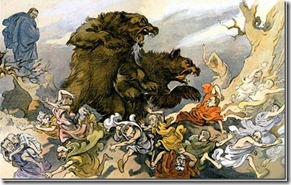Archive for March, 2016
Suddenly, She Bears!
One of the worst stories of the bible is found in II Kings 2:23-24 I want to do some work on interpreting it in a positive way. it goes like this
From there Elisha went up to Bethel. As he was walking along the road, some boys came out of the town and jeered at him. “Get out of here, baldy!” they said. “Get out of here, baldy!” He turned around, looked at them and called down a curse on them in the name of the Lord. Then two bears came out of the woods and mauled forty-two of the boys.
Many of the passages of the bible that seem violent or unjust put us in defensive-mode exegetically. We start looking for outs. “Maybe it’s a metaphor!” we say. Or perhaps the opposite “Maybe the point is simply to know it happened”. The same questions are asked with Joshua’s conquest, or with Jacob’s two wives. Etc.
 I suspect many ancient readers would take this story at face value, believing this to have actually happened historically, and believing it to be justified on both God’s and Elisha’s part because the kids were evil and deserved it. The sort of skepticism about whether or not stories really happened exactly as described is a later development.
I suspect many ancient readers would take this story at face value, believing this to have actually happened historically, and believing it to be justified on both God’s and Elisha’s part because the kids were evil and deserved it. The sort of skepticism about whether or not stories really happened exactly as described is a later development.
Therefore, while assuming it happened, believing it happened would not have been of special importance to them. The book of Kings repeatedly tells you that if you are looking for complete historical records you should look elsewhere! So the question becomes "What would it mean to ancient readers that this story took place?"
It would mean God is mighty, that Elisha is empowered through Gods and all of God’s prophets by extension are so empowered. It would mean that God and God’s prophets do not abide being mocked.
Throughout Kings, there is a tension between Kings and Prophets. Who has the real power? This passage says Prophets do. Kings may control armies and political structures, but those things are useless against a person who does not need agriculture to eat, because they are fed by ravens, who can fight using obedient wild beasts, for whom the earth itself is subservient.
Kings therefore, had better listen to prophets, or they will see their empires split and their armies fall.
But now that the historic prophets and kings have fallen away, What does that mean to us? How does it impact out lives of faith?
I think the passage still speaks to alternative forms of power. In the age of Eric Snowden and Chelsea Manning, bloggers and street artists can bring politicians to their knees. Police might brutalize young people of color, but young people of color equipped with video cameras and a firm moral backbone can fight back and win. The prophets of our age will not be mocked. They possess the sway of the crowds and the voice of the truth and against them no political or institutional power can stand!
The false ones will fall of course. God is not with them. But if you find yourself on the wrong side of a true prophet. If you find yourself mocking a person speaking truth to power saying "bald and powerless young idiot, give up" well then you had better watch out. You better look behind you. They have more power than you know.
…or something like that.
In Defense of Street Evangelism
 Five years ago I got off a plane for an orientation with a Christian College Ministry I took a job with, and learned the training was going to entail going out and talking to strangers about the gospel. It was a very uncomfortable realization.
Five years ago I got off a plane for an orientation with a Christian College Ministry I took a job with, and learned the training was going to entail going out and talking to strangers about the gospel. It was a very uncomfortable realization.
Street preaching, and street evangelism have become such a presence in our minds that the mere thought of it seems to cause anger to bubble up from deep within us. We have all seen bad preachers yelling at people, or disaffected church members made to stand on corners with impersonal tracts. For many Christians, that is the image conjured by the word “evangelism” and they conclude therefore that they do not like evangelism!
And that’s the funny thing. Most of us hate it. But many of us feel conflicted, because at some level we thing we are supposed to like it. Like it’s this good thing “evangelism” that we know we are all called to do. But we hate it and we want it to go away.
And we are right to hate the things we have seen. Being mean, hateful, judgmental, or yelling at people in public is bad behavior. This should be obvious and non-controversial. Street preaching does not get a free pass. You are not morally allowed to engage in bad behavior because you call it “street preaching”
Street preaching however also does not deserve unilateral condemnation. Just because some people have behaved badly and called it street preaching, does not mean that anything which could be considered preaching on a street is bad behavior.
I have come to think that loving, interesting, engaging, street preaching can be a great way for people who have never had the experience of talking about their faith to others to practice. The street is a low consequence environment with lots of people, so approaching one of them, swallowing your own sense of awkwardness and saying something like “Would you have time to talk about God with me?” even to hear a lot of “no” can make it much easier when that situation comes up with your friends and associates.
I don’t think a lot of people have authentic conversions as a result of street preaching, even good street preaching. I do not think the numbers reported by the ministries are accurate. (What kind of follow-up is really being done?) But I do think there is a place for it. Evangelism after all, is not all about conversions.
Small Groups and Gender Segregation
I wrote last week about a difficulty I have finding bible studies that study the Bible in a sea of group meetings that study other things they feel are more interesting or more important. I want to follow up on that with a related idea.
 What is up with all the separated men’s groups and women’s groups?
What is up with all the separated men’s groups and women’s groups?
What exactly are we afraid of happening with unmarried people in a room together?
It made a certain amount of sense to separate the girls and boys when I was 9 and girls were yucky, or when I was 14 and girls my age were adults already. But I am seeing nary a coed study group at many churches straight through to death.
If there is a mixed group it’s for married couples. Still, men go to the Men’s Breakfast, women go to their Beth Moore class. Why?!?
Well I’ll tell you why actually. It’s because of this same stupid trend of fearing and avoiding the Bible and talking about something else instead. Men’s groups end up talking about Lust and Porn the whole time. Women’s groups probably end up talking about Submission and “Biblical Womanhood” and such crap. Married groups talk about how to have a good Christian marriage. And that is the practical extent of our Christian education.
There is no way that in an authentic inductive study of the book of Judges you need to get vulnerable about your masturbation habits. That simply will never ever come up. And if an emergent issue does arrive, you know how to pull someone aside.
There are 66 books in scripture. 1 Corinthians 6 is one chapter. If you need to split for that week. Or the 1 Timothy 2 week or the Ephesians 5. Fine. I’d submit that there is much to be gained even in those chapters from having both voices, but I’ll grant that sometimes people need to feel extra safe. Still, I see no reason for that to be the topic every week. EVER. It shouldn’t even be one week every year.
Let’s quit pretending like the central issues of Christian discipleship are gender specific.
Anybody Know of a Bible Study Where we Actually Study the Bible?
I can’t find one. I have been looking. They are frighteningly hard to find. (I started a couple)
Still, it’s a trend I want to talk about. I see more and more churches holding "Bible studies" where nobody brings their Bibles because the Bible is not opened, but instead, one verse, or theme from the Bible is pulled and expounded upon by a modern author, and the text of that author is studied with discussion questions on a separate sheet of paper. Another option is to study the sermon from the previous Sunday.
 The obvious motivation of this behavior is that we, as a people, like the idea of the Bible, but we don’t like the Bible itself. We think it’s un-fun un-interesting, and we think the work of these modern authors and preachers is comparatively interesting. We certainly do not trust people to interpret the Bible for themselves. Protestant Reformation be damned, if there is an interpretive question asked with out the pastor present you can be sure it will be deeply leading and “Socratic”
The obvious motivation of this behavior is that we, as a people, like the idea of the Bible, but we don’t like the Bible itself. We think it’s un-fun un-interesting, and we think the work of these modern authors and preachers is comparatively interesting. We certainly do not trust people to interpret the Bible for themselves. Protestant Reformation be damned, if there is an interpretive question asked with out the pastor present you can be sure it will be deeply leading and “Socratic”
I want to be clear as I call it out that I’m not trying to shame those who think that way. If you think the Bible is more boring than John Piper or Rachel Held Evans or whoever that’s fine. I don’t think people who believe that are bad Christians, but I do disagree entirely.
I have had incredible experiences as a direct result of the biblical text that far surpass anything offered by the greatest writers of our time, or any time previous. My learning by attempting to practice and imitate the content of Luke and Acts , of studying Hosea in it’s original Hebrew, of walking around the ruins of the seven churches of Revelation and hearing the message of Christ through John as applied to my own temptations… They lead me to believe that there is more available.
As a result, even when I do reach a part of scripture that doesn’t light my fire (Leviticus, Chronicles, Titus) I tend to adopt a searching posture. I want to ask “What am I missing?” and “where are the problem who love this book” and “What do they love about it?” I want to read it in community and learn from other perspectives.
To that end I do have one bone to pick with the Christian Book Club or Sermon Pep Squad meetings. Could we at least call them what they are? I’m really sick of trying to answer this groaning in my heart but accidently ending up in a place I don’t belong that never intended to answer this longing.
Demons
I don’t really believe in demons. At least, not literal persons that pester the human race. I do however think the Bible was talking about something very real and very important that Jesus healed people of. I’ve recently been working on a new way to read those passages, and it’s serving me well. It makes sense to me both on a logical and an exegetical side. Here’s what I have so far.
In the ancient near east, particularly in the Hellenized world it was very common to personify ideas as a way to make them easier to talk about. Gods and goddesses were already personified, and represented certain needs, forces or virtues. When something which was not already a god was needed for discussion, say Pistis (faith) or Liberty we simply personified it. Nay, we personified "Her".
 The ancient world is full of depictions of gods and goddesses in the same plane with Caesars and soldiers and even personified land masses like Britania and Anatolia. All fighting, or falling in love, or interacting with one another in representative ways.
The ancient world is full of depictions of gods and goddesses in the same plane with Caesars and soldiers and even personified land masses like Britania and Anatolia. All fighting, or falling in love, or interacting with one another in representative ways.
If we used the same system in the US today, we would talk about the Spirit of Trump, and of Socialism, and of Feminism, and Progress, and Liberty (some things never change) and these small gods would speak for themselves and squabble with each other and influence people.
When Jesus entered the scene as "The God" there was considerable consternation in the early church about the ramifications this would have on the other gods, or other spirits or “diamons”. (That’s the Greek spelling)
That word was used in ancient Greek documents to describe a kind of these small gods. One that might visit for a time and help you with your housework or your writing. Another, similar being was a "genius" who would come upon you suddenly and give you a great idea.
It did not make much sense for the early Christians to just deny these things these things. They could not imagine a way to talk which would describe these spirits as "not real". They are very real. They influence people. Some people are desperately paralyzed by them even. Socialism is real, Wisdom is real, Caesar is definitely real and present even to subjects who have never seen a royal parade.
So what’s an author to do? How do you make a theologically correct statement about Jesus among the Diamons. Is he prince of Diamons? No. But he has power over them and they respect him. And let me tell you about the people he helped….
When a child is raised in generational poverty they can be said to be oppressed by the spirit of that situation. When a person is subjected to so much violence and injustice that they see nothing else they may be possessed by that violent spirit. And yes, when a person has a debilitating irrational fear, it is not incorrect to pray that it be expelled or exorcised.
Those exorcisms may happen by prayer alone. They may come with application and administration of love, with welcome into community, or in some other way. “The Hunger” for instance is expelled with food. I think this is why you see so much variety in Jesus’ healings, it prevents us from trying to imitate Jesus exactly as a ritual, and invites us instead to do the right thing for the right person at the right time.
An End of the Fear of Whales
I hate that so many of my posts are meta-posts. It was less than 6 months ago I was reflecting on where we had come from and updating my website with this as a regular feature. Yet here we are again, and what I feel pressed to write about is my own writing.
Screw it, says I I’m pretty much the only person who reads this thing anyway right? RIGHT? I’m not doing this for ad revenue. I’m doing this to process my emotions. And right now my emotions are questioning the future of this venue.
”Fear of Whales” was started by a college kid who was discerning his place in the world with a call into ministry despite serious concerns and misgivings about that career. It was a way for me to reflect upon my life as a person who didn’t want to be called, but was going to try to go anyway. “Fear of Whales” was about my path to ministry, and the ideas I had on the way there.
I have a counter on my phone. 82 more days until I graduate from Seminary. It could easily be another year after that before I am an officially ordained minister, but still. The end is in sight. The path doesn’t fork anymore from here. I could turn back… but that’s not likely. Something in me that I’ve previously needed to process is just about settled.
There’s another piece of it too. The times in the past ten years where I have written the most were always the loneliest and slowest times of my life. When I had a youth group, or a thriving campus ministry, or a cigars and theology pubnight I always wrote less because I was sharing my new insights with them instead of casting them into the ether(net). That’s true again. I’m preaching every week and posting those videos online. People are listening to what I have to say. I’m saying more than I often care to.
I dunno blogfans. I’m not shuttering this thing yet. I still have 82 more days to fear whales. After that maybe I’ll start a different blog about being a young pastor (as if that hasn’t been done before) maybe I’ll be writing church bulletins and that plus sermon will leave me with nothing to say. Maybe something new will break in me and I’ll keep needing the reflection space for the forseeable future.
Regardless I’ll be as interested as you to see how it turns out. Probably much more interested